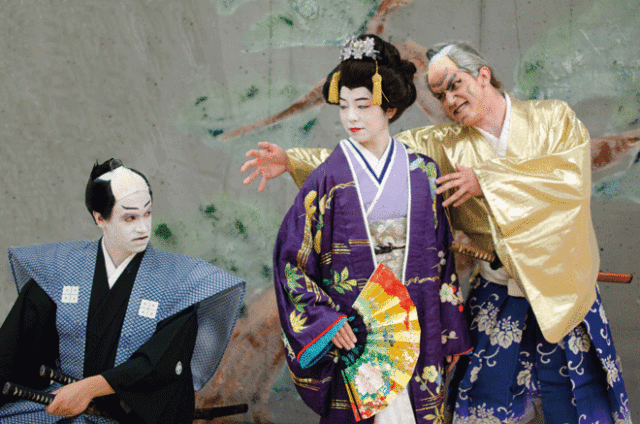By Shihou Sasaki The North American Post
The traditional Japanese Kabuki play “Chushingura (Revenge of the 47 Loyal Samurai)” will be performed by students in Portland this month as an introduction of Japanese culture and American kabuki theater.
Portland State University’s Center for Japanese Studies and the School of Theater & Film will take on the challenge of performing a Grand Kabuki Theater program as the firstever “Chushingura” by a university in the continental United States.
The program will be directed by Professor Laurence Kominz, who has been introducing kabuki culture to the Portland area since the 1990s.
“I consider Kabuki to be the most entertaining theater form in the world,” he said. “I think it’s equally entertaining as the grand musicals that Americans love so much.”
Since 2003, Kominz has upgraded his program to a small scale kabuki theater from what he called “Yukata Kabuki” in the early stages with limited costumes and stage props. He has successfully performed three Kabuki plays, “Uiro Uri (The Medicine Peddler),” “Kuruma Biki (“Pulling the Carriage Apart)” and “Iwashi Uri Koi no Hikiami (The Sardine Seller’s Net of Love).”
Kominz said that Portland residents have wanted to see more Kabuki plays even though the city has ever had only one show of Grand Kabuki Theater.
“They deserve to see the [kabuki plays] and deserve to understand them immediately, not using subtitles or an earphone guide,” he said. “That means they deserve to see it in English.”
Kominz saw a successful Chushingura performance in English at the University of Hawaii in 1979. Calling the play “American Kabuki,” Kominz believes that American kabuki theater can be as successful as Japanese theaters.
“It should be performed in English just as Japanese people see Shakespeare in Japanese. We should do it, and we can do it.”
But without question, this play will be one of the biggest challenges ever for his program, from the budget to staging.
According to Kominz, generous funds from multiple institutions could cover the costs, including about 60 costumes for the performance. Students have been working hard at rehearsals for 24 hours a week. With about 40 cast members, some students are taking on extra roles, which require them to change costumes several times.
He said that two-thirds of the students were unfamiliar with kabuki at the beginning of the project.
“You might think it’s crazy that we started from there,” the professor said. “But the students are working so hard. We are very gratified.”
Kominz added that a few key professionals including local and Japanese performers will join the group. Wynn Kiyama, executive director of Portland Taiko, who works with the university’s music department is the musical director. Three seniors who are taking the course will also join the performance on stage, Kominz added.
The script was edited to a three-hour show including a 20-minite intermission from the original Chushingura script of about eight hours.
“The movements are similar and the music will be authentic,” Kominz said of the performance description. “It will be recognizable for Japanese as kabuki too. The costumes will be as authentic as we can make them.”
He added that there will be a tremendous value on this performance not only for people to learn about the story of honor, royalty, service and sacrifices in the early modern times of Japan, but also as an open gate for the introduction of Japanese culture. He pointed out that this show will be an opportunity to share how the Japanese love humor and show emotion openly.
“These traditional values were certainly spoken to people at the time but still appeal to Japanese, which is why Chushingura is popular today,” Kominz said.
Ken Ruoff, professor and director of the Japan Studies Center, shared his high confidence in the program’s success and forward expectations.
According to Ruoff, Oregon State has the most Japanese language education per capita except Hawaii, and data has been proving how Oregonians are interested in Japan. Now the university has 35,000 students on campus, which is a great opportunity to introduce Japanese culture to the next generation.
“We expect that there will be hundreds and hundreds of people who will develop an interest in Japan sparked by seeing our Kabuki play,” Ruoff said.
The performance will be held eight times on Wednesdays, Saturdays and Sunday from Feb. 25 to March 5 at the Lincoln Performance Hall. More information can be found at www. pdx.edu/cjs/the-revenge-of-the-47loyal-samurai or www.facebook. com/47loyalsamurai.




